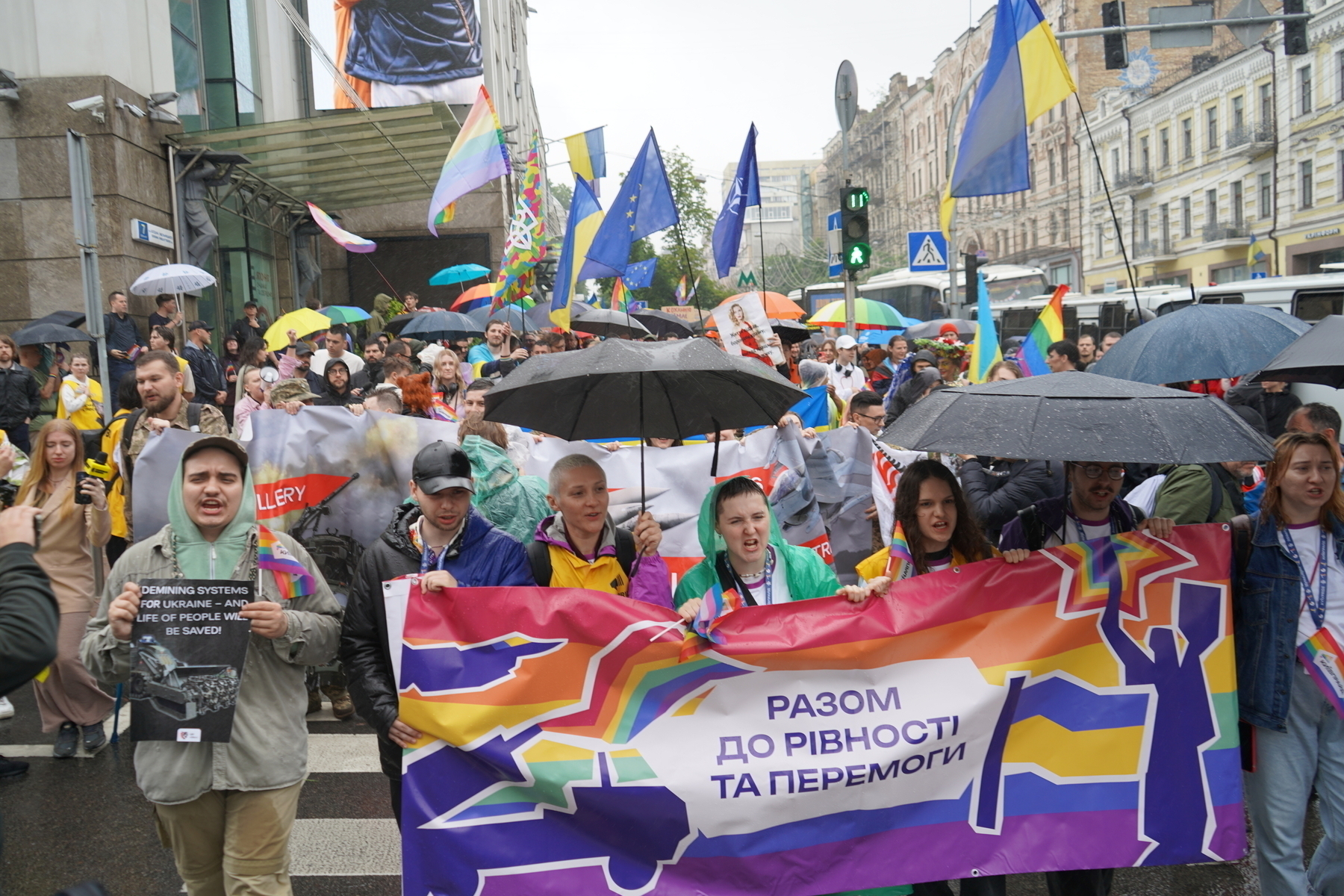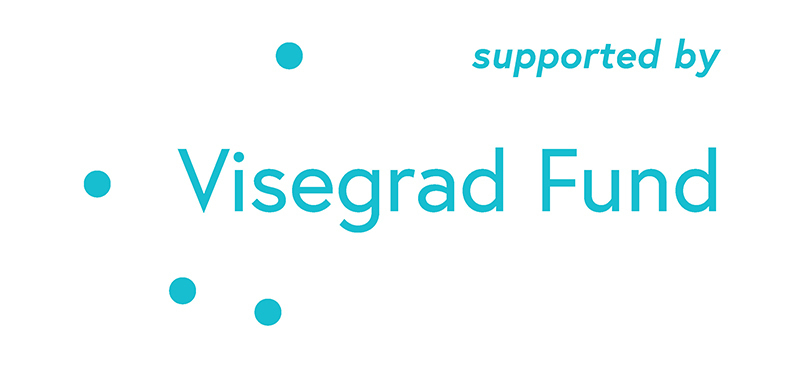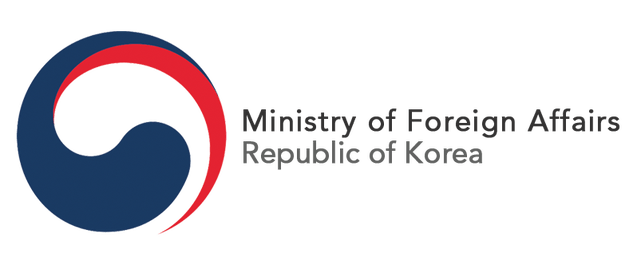
Homophobia and transphobia are intrinsic to today’s Russian ideology. They fuel violence and war crimes against LGBTQ+ people in the Russian-occupied territories of Ukraine, activists say.
A 20-year-old Roman went through a month and a half of detention and torture in Russian-occupied Kherson because they “suspected him of separatism” or “sending (Russian) coordinates to the Armed Forces.”
As he’s described to the Odesa-based organization Gay Alliance, during interrogations, Russians asked if he knows any gay people.
“They used a different word for ‘gay.” I think if they’d known that I’m connected to LGBT in any way, I wouldn’t be able to leave.”
LGBT human rights center Nash Svit releases an annual report into the LGBTQ situation in Ukraine: for 2022, that report included 31 Russian war crimes against LGBTQ+ people; in 2023, the report described three such war crimes; in 2024, they recorded two instances of anti-LGBTQ+ actions (of Russians under occupation) without classifying them as war crimes.
Decrease in numbers, Nash Svit writes, might be because the occupied territories liberated in 2023 were “rather small, and information about violations is obtained, most often, from local residents after their liberation.”
With the front moving much slower in 2025 because of the rise in FPV (first-person view) drones, it becomes even more difficult for Ukraine’s Armed Forces to liberate Russian-seized territories.
Consequently, it becomes harder for LGBTQ+ organizations and human rights activists to track human rights abuses and war crimes. In Crimea, which was occupied for over 11 years, Russian anti-LGBTQ rhetoric fueled human rights violations, justified by “preservation of morality,” increasing the number of cases of hate-motivated violence on the peninsula.
One of the Russian motives for these crimes is reflected in popular Kremlin propaganda narratives: being anti-LGBTQ means preserving “traditional values” in the face of “homosexual Europe” or America.
In 2022’s report section on LGBTQ+ people under Russian occupation, Nash Svit wrote that the pretext for homophobic and transphobic violence was “mostly confidential information about the private life” found on the victims’ phones and, "in some cases, their appearance or manner of behavior.”
“If the Russian military or the occupation administration find out that someone belongs to the LGBTQ community, such people are subjected to insults, violence, extortion, restriction of freedom, and their very lives are in danger,” Nash Svit wrote.
Nash Svit also relays many anonymous testimonies of LGBTQ+ people who survived through Russian war crimes in their reports.
“We have survivor and witness accounts from people whom Russians detained on the occupied territories. One person said that Russians have a special category of cases for the LGBT community. Even wrote on the cover the letter “H,” for “humiliated,” to inflict on these people even more suffering,” says Vitalii Matvieiev, the head of human rights NGO Projektor, to Gwara Media.
Their project “Access to justice” collects testimonies of Russian crimes against LGBTQ+ people from the occupied, deoccupied, and frontline territories of Ukraine.
In their 2024 report, Matvieiev says there’s information on 81 people who went through this experience, 20 people who agreed to be interviewed, and seven cases that are classified as war crimes against LGBTQ+ people and are now a basis for criminal proceedings under the Prosecutor’s Office of Ukraine.
Matvieiev and his team started working with this topic in 2023, to help members of queer* community find a path to justice. Having collected the testimonies, “Access” team sends them to the International Criminal Court (Matvieiev hopes to build a case for a separate proceedings that looks into Russian war crimes against LGBTQ+ people specifically in the ICC) and to Ukraine’s General Prosecutor’s Office.
Matvieiev says their collaboration with the Ukrainian justice system started with the realization that such cases are a blindspot for the Prosecutor's Office. Having gathered the first testimonies — they decided, after some survivors' consent— to transfer them to the authorities.
Sometimes, people who share their testimonies only want them to appear in the ICC’s proceedings.
“They don’t trust the law enforcement,” Matvieiev says. Even though the team explains to survivors that the prosecution through the ICC would take much longer, some of them are still not willing to go through possible homophobia and transphobia within the Ukrainian system.
Ukraine still doesn’t have a law for the prosecution of hate crimes. The draft bill for it, as well as the draft bill to allow for civil unions are currently stuck in the bureaucratic doldrums of the country’s parliament, despite many human rights activists drawing lawmakers’ attention to the importance of both.
Nash Svit’s 2024 report on LGBTQ+ also documents 33 cases of people facing discrimination, humiliation, or abuse in police departments — often, during reporting a homophobic or transphobic crime committed on the Kyiv-controlled territories — or from other representatives of law enforcement.
“We reached an agreement with the Prosecutor’s Office that, as a civic organization that has history and trust from the community, has experts who know how to work with gender-based crimes, collect evidence, conduct interviews… We’ll gather and then transfer these cases. And if they need, they can come and question this person here in our office,” Matvieiev says.
Many LGBTQ+ people from Ukraine — including those who survived through Russian occupation and have been subjected to violence there — became refugees in Europe. Matvieiev says several people his organization interviewed are currently there, undergoing rehabilitation.
In 2022, Ukrainians were welcome in Europe and “met with understanding,” — not just because of the Russian aggression,but also because many assumed “every Ukrainian would want to use a chance to leave for a better place,” says Eugenia Seleznova, Ukrainian author and a PhD Candidate at Central European University, Gender Studies Department in Vienna, Austria, said to Gwara Media.
That was especially the case with LGBTQ+ refugees because “Europe promotes itself as ‘queer haven,’ where every queer person aims to be,” she adds.
While multiple reports suggest that Russian war crimes are underreported in Europe across the general public, Russian war crimes based on SOGI (sexual orientation and gender identity) are even less known.
“My colleagues from the Gender Studies Department are indeed aware of what is going on and follow the news tightly. But if we are talking about the general public, I’m afraid the persecution of LGBTQ+ Ukrainians under the Russian occupation appears to be a rather niche piece of knowledge,” Seleznova says.
“(They) get aware of the shellings of Kyiv or Odesa every then and now, but they don’t really have many occasions to learn about what is happening to people in Mariupol, Donetsk, Melitopol, Crimea — let alone about particularities of threatened queer lives there. One would have to consciously research the topic to learn anything about it, yet most people outside of the war — or queer — reality don’t have many reasons to do that.”
Seleznova studies the impact of the war on LGBTQ+ Ukrainians’ social relations and sense of belonging.
Though she warns against the generalization of “Europeans,” saying that the attitude towards LGBTQ+ from Ukraine is “an intricate contextual picture starting with the state-wide gender politics (think, for instance, Germany vs. Hungary),” a frequent observation Seleznova has is this:
“Many LGBTQ+ Ukrainians are treated by their European fellows with respect and acceptance as queers while facing all sorts of assumptions and othering as Ukrainians. One of my interviewees, a young transgender refugee, put it, ‘Here, they don’t ask stupid questions like “What’s in your pants?” the way it could happen back in Ukraine. Yet the minute they learn where I’m from, they’d always want to know what I think of Putin or if I have lost anyone in this war.’”
Currently, Ukraine investigates over 150,000 Russian war crimes. Although the known numbers for war crimes against queer people are few, after interviewing many people from Kherson, Kharkiv, Dnipropetrovsk, Zaporizhzhia regions, Matvieiev is confident that the violence against LGBTQ+ people Russians inflict has a systemic nature.
In addition to marking cases of LGBTQ+ people with “special” letters, testimonies suggest Russians purposefully search for them on the territories they capture, along with the activists and journalists, and soldiers and veterans, Matvieiev says.
Projector continues to work with the law enforcement structure of Ukraine, — providing them with testimonies of LGBTQ+ people who survived Russian war crimes and creating a space where queer people would be comfortable sharing their experiences with representatives of the system which is often hostile to them.
The organization also organizes training for law enforcement, particularly investigators in local departments who’ll be the first contact of survivors, on how to work with queer survivors without traumatizing them or discriminating against them.
*Within the context of this article, I use “queer” and “LGBTQ+” interchangeably.
Cover photo: Pride March in Kyiv, 2024 / Photo: Denys Glushko, Gwara Media
 |
 |
 |
 |
|---|
 |
 |
|---|
The project is co-financed by the governments of Czechia, Hungary, Poland and Slovakia through Visegrad Grants from the International Visegrad Fund. The mission of the fund is to advance ideas for sustainable regional cooperation in Central Europe.
The project is supported by the Ministry of Foreign Affairs of the Republic of Korea.
The post Russians inflict systemic violence on LGBTQ+ people in occupied regions of Ukraine appeared first on Gwara Media.
